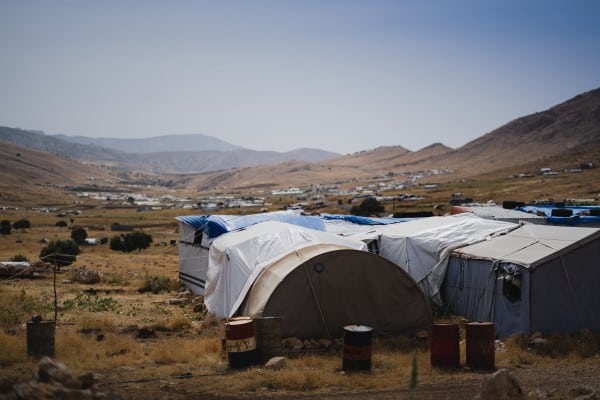This page contains affiliate links. This means if you a follow a link and make a purchase, at no additional cost to you, Humanitarian Careers will receive a commission. Thank you for supporting the site.
Every year, hundreds of millions of people receive humanitarian aid. These are people affected by crises, conflicts, and disasters. Hundreds of humanitarian organizations, NGOs and donors operate around the world assisting people whose lives have been impacted by crises. But what does humanitarian aid actually do? What is its purpose?
The purpose of humanitarian aid is to save lives and reduce human suffering. It aims to help people affected by crises re-establish their livelihoods, secure food and shelter and receive education and healthcare. Its purpose is also to protect vulnerable groups during a crisis and build more disaster resilient communities.
Now we have an overview of the purpose of humanitarian aid, let’s break down its main objectives in some more detail…
The Seven Objectives of Humanitarian Aid
The most important aim of humanitarian assistance is to save lives.
When communities are hit by disasters, conflicts or crises, urgent aid is needed to prevent many people from dying. Humanitarian aid provides food, shelter, healthcare, protection and clean water and sanitation in order to prevent more deaths following a disaster or crisis. This is the main purpose of humanitarian aid.
As well as saving lives, the purpose of humanitarian aid is to prevent injury, suffering and further hardship when a crisis hits.
Providing people and communities with financial and material resources, as well as technical expertise, helps to limit the impact of a disaster. This is one of the main objectives of humanitarian assistance.
Another objective of humanitarian aid is to protect and rebuild the livelihoods of people affected by crises.
When disaster or conflict hits a community, huge numbers of people lose their businesses and jobs. The purpose of humanitarian aid is to help people re-establish themselves and prevent them from falling into poverty as a result of the crisis.
One of the main purposes of humanitarian assistance is to ensure crises affected children still receive an education.
Wars and disasters can hugely disrupt school systems and if assistance is not provided then millions of children could go without an education. The aim of humanitarian aid is to provide schooling so that children affected by crises receive the education they need.
A key aim of humanitarian aid is to protect vulnerable people during a crisis. When crises hits, networks of families and communities are often broken. This means more vulnerable people, such as women, children, the elderly, religious and ethnic minorities, and those of different sexual orientations often need additional protection. Providing this is one of the mains purposes of humanitarian aid.
Another purpose of humanitarian assistance is to increase the capacity of local actors to improve their responses to future crises.
Many areas affected by conflicts or disasters are prone to repeated crises. International humanitarian aid aims to work with local actors so that they have the skills, knowledge and resources required to respond when further disasters hit.
A final purpose of humanitarian aid is to help people recover as quickly as possible from a humanitarian emergency.
Rebuilding infrastructure – including roads, schools, health facilities, business and houses is key to communities recovering from a crisis. Many communities lack the resources do this after a disaster hits and so a key purpose of humanitarian aid is to provide finances and materials to help disaster and conflict hit areas rebuild.
What Is the Point of Giving Humanitarian Assistance?
Each year, billions of dollars are donated in humanitarian aid. Many countries allocate a percentage of their income to towards overseas aid. On top of this, individuals and charitable organizations donate money towards humanitarian causes they care about. But why? What actually is the purpose of giving humanitarian aid?
The main reason humanitarian aid is given is to help people in need.
When people see human suffering around the world, they feel compelled to act. Providing assistance so that lives can be saved and communities can recover is one of the biggest reasons governments, charities and individuals give humanitarian aid.
A second key reason why humanitarian aid is provided is to stop crises from spreading or getting worse.
Humanitarian assistance is key in helping people to rebuild their lives after a disaster, but it can also stop people from being drawn into conflicts or being unable to recover after their livelihoods are destroyed. Containing a crisis is an important purpose of humanitarian aid.
Another purpose of humanitarian aid is that it helps improve global security.
When people fall into poverty, they are more likely to join armed groups. Containing conflicts also prevents further warfare as well as reducing areas where criminals, terrorists or drug cartels can operate. Giving humanitarian aid is very much in the donor countries strategic interests.
A further reason why humanitarian aid is given is because it actually has an economic benefit.
Aid benefits the economies of crises affected countries by providing jobs within NGOs, doing local procurements, and helping business and individuals return to economic activity. It also has an economic benefit to the donor country as most aid funding is directed through large international NGOs and UN agencies. These employ hundreds of people in the donor country.
Another, less spoken about, reason why humanitarian aid is given is because of the prestige.
Donor countries give humanitarian aid for mostly altruistic reasons. However, aid can also be used to promote their values, as a soft power tool, and as a way to build alliances. Most humanitarians don’t want to admit it, but prestige and national promotion are part of the purpose of humanitarian aid.
A final reason why humanitarian aid is given is because it is morally right.
It is right that richer countries use some of their wealth to help people living through crises, conflicts, and disasters. It is also right that some of this wealth be used to help people living in poverty and experiencing human suffering. This is a major purpose of humanitarian aid – it is simply the right thing to do.
Humanitarian Aid Online Courses
If you want to learn more about humanitarian aid, including what it’s purpose is, we highly recommend the online course When Disaster Meets Conflict by the Erasmus University Rotterdam. We think it’s one of the best overviews of the humanitarian sector. Follow the link to the course’s page for more information.
The International Humanitarian Law Theory and Practice online course offered by Leiden University in the Netherlands provides a fantastic theoretical overview of humanitarianism. We think it’s one of the top online courses for those who want to understand the basics of international humanitarian law. Click the link to visit the course’s page for more information.
If you are looking to work in humanitarian aid, we highly recommend the online course International Humanitarian and Development Careers. We think it also provides a great overview of the humanitarian sector and gives valuable insights for those searching for jobs in humanitarian aid. Follow the link to the course’s page for more information.
What Causes People to Need Humanitarian Assistance?
Currently, there are 235 million people in the world in need of humanitarian assistance. Across every continent a range of crises have meant that people are unable to provide for themselves or their families. Let’s take a quick look at what causes people to need humanitarian aid…
One of the major causes of humanitarian responses is human conflict.
Wars cause widespread death and destruction and there is an urgent need for aid to be provided to both people caught up in the fighting and those fleeing. Humanitarian aid has a long history of assisting victims of conflicts and this remains one of its main purposes.
Another cause for humanitarian aid to be provided is when people are displaced.
People can be forced to flee their homes due to war and human violence, as well as natural disasters, poverty, famine, or economic crises. When people are forcibly displaced, they leave their homes with often very little and are in desperate need of humanitarian aid.
Famines can affect millions of people. If urgent humanitarian assistance is not provided than huge numbers of people can die of starvation. Lack of food also causes long-term issues in both children and adults which is why assistance must be provided.
Droughts and man-made famines are one of the major causes of humanitarian crises and the need to provide aid.
Earthquakes and tsunamis can have a devasting impact on communities. When they hit, urgent assistance is needed to save lives, rescue people, treat injuries and avoid further destruction.
Earthquakes and tsunamis are one of the biggest causes for people to need humanitarian aid. It helps people rebuild their lives after the disaster as well as become more resilient to future calamities.
Another thing that causes people to need humanitarian aid are extreme weather events.
Typhoons, cyclones, storms, and floods all cause widespread death and destruction. Other extreme weather events such as wildfires or landslides can also cause humanitarian crises. A major purpose of humanitarian aid is to assist communities affected by extreme weather.
A severe economic downturn or even the economic collapse of a country can also be a cause for humanitarian aid to be provided.
When economies collapse huge numbers of people lose their jobs and livelihoods. This can cause them to fall into poverty or migrate to find opportunities. Humanitarian aid is provided to help people recover and rebuild their lives when economies fall into severe crises.
A final cause for humanitarian aid to be provided is when there are outbreaks of disease or pandemics and local health systems are overcome. Humanitarian aid can provide direct medical care to people affected, as well as give donations of equipment and drugs. Aid agencies also provide expertise on treating diseases and build local health capacity.
Is Humanitarian Aid Helpful?
Now we know the purpose of humanitarian aid, as well as what causes people to need it and why it is given. However, it is actually helpful? Do people who receive humanitarian aid actually benefit from it?
Humanitarian aid is enormously helpful to people affected by crises. It assists people to meet their basic needs and allows communities to recover. The help provided by humanitarian aid is vital to limiting the impact of crises on peoples lives, as well as helping communities to become more resilient to future disasters.
If humanitarian aid is not provided, crises hit communities could struggle to recover. This would mean more lives lost and more people injured. It could also mean more people falling into poverty as livelihoods and business do not return. Without humanitarian aid, children affected by crises might not receive an education and communities could go without healthcare. This shows how helpful humanitarian aid is.
If you’re wondering what the difference between humanitarian aid and development aid is, Savannah at The Global Humanitarian has a great explainer. Be sure to check it out. Or If you want to learn more about humanitarian aid, explore our list of the top humanitarian aid online courses here.





